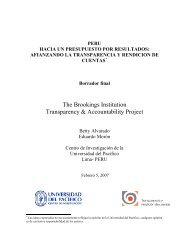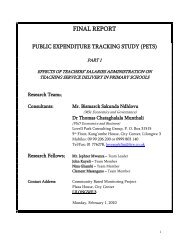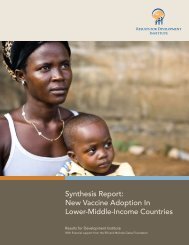Provider Purchasing and Contracting for Health Services_The Case
Provider Purchasing and Contracting for Health Services_The Case
Provider Purchasing and Contracting for Health Services_The Case
Create successful ePaper yourself
Turn your PDF publications into a flip-book with our unique Google optimized e-Paper software.
appears to be minimal evidence that meaningful progress has been made toward achieving<br />
these two initial goals.<br />
As a matter of fact, the dissolution of the boards, which led to the reversal of decentralization<br />
in the health system, appears to have worked against the initial objectives. For instance, the<br />
Ministry of <strong>Health</strong> currently functions as both a principal <strong>and</strong> agent by virtue of being a fund<br />
holder <strong>and</strong> service provider. This lack of legal separation between the Ministry of <strong>Health</strong> <strong>and</strong><br />
District <strong>Health</strong> Management Teams <strong>and</strong> Hospital Management Teams dilutes the validity of<br />
the contractual arrangements <strong>and</strong> the accountability of the institutions. To this effect, some<br />
respondents observed that contracts are in some cases not signed, <strong>and</strong> the Ministry of <strong>Health</strong><br />
does not conduct per<strong>for</strong>mance audits, partly undermining the essence of contracting.<br />
Although the private <strong>for</strong>-profit health sector has been emphasized since 1991, very little has<br />
been done to <strong>for</strong>mally integrate it into the health system. In areas with a large private sector<br />
presence, there is a lack of master planning to include all stakeholders. According to<br />
interviews with Ministry of <strong>Health</strong> officials, there is not yet a clear policy on how the<br />
government should work with the private sector in Zambia. This is contrary to the declaration<br />
that one of the target areas <strong>for</strong> action to achieve the Millennium Development Goals is the<br />
use of the private sector to exp<strong>and</strong> access to health care. Governments must provide<br />
stewardship in overseeing their health systems by providing a clear vision <strong>and</strong> direction <strong>for</strong><br />
health policy as well as regulation (Francisco A <strong>and</strong> S. Martin 2006)<br />
Moreover, the accreditation procedure <strong>for</strong> private facilities to enter the referral system is not<br />
clear. This calls <strong>for</strong> the Ministry of <strong>Health</strong> to provide appropriate st<strong>and</strong>ards <strong>and</strong> guidelines to<br />
the private sector on acceptable levels of practice. Moreover, the Ministry of <strong>Health</strong> provides<br />
no incentives aimed at attracting the private sector to participate in the implementation of the<br />
Basic <strong>Health</strong> Care Package through the public health care delivery system. <strong>The</strong> reasons<br />
usually cited <strong>for</strong> this state of affairs include inadequate knowledge about the private sector by<br />
Ministry of <strong>Health</strong> policymakers; limited dialogue between the public <strong>and</strong> private<br />
stakeholders; <strong>and</strong> the lack of institutionalized policy instruments from the Ministry of <strong>Health</strong><br />
<strong>for</strong> interacting with the private sector, especially in financing, regulation, <strong>and</strong> dissemination<br />
of in<strong>for</strong>mation. Given this background, contracting with the private sector in Zambia has<br />
been limited to nonclinical services <strong>and</strong> laboratory services.<br />
Although private <strong>and</strong> public providers treat each other with suspicion, they are willing to<br />
work together. On the subject of contracting, the District <strong>Health</strong> Management Teams<br />
observed that it would be more effective if they were given more autonomy <strong>and</strong> resources to<br />
enable them to purchase services from the private sector. Inadequate funding of public<br />
providers is perceived to be the major constraint to contracting-out. <strong>The</strong> private sector, on the<br />
other h<strong>and</strong>, recommended a voucher system that covers clients who are unable to pay through<br />
an insurance system.<br />
<strong>The</strong> Ministry of <strong>Health</strong>, on the other h<strong>and</strong>, reached an advanced stage in developing a social<br />
health insurance scheme as a health financing mechanism. <strong>The</strong> scheme is expected to be<br />
extended to the private sector covering all citizens. Furthermore, the Ministry of <strong>Health</strong> is<br />
promoting investment in a wide range of potential contracting areas with the private <strong>for</strong>-profit<br />
providers in both clinical <strong>and</strong> nonclinical functions, including specialized medicine, training<br />
of human resources, <strong>and</strong> repair of medical equipment, among other functions.<br />
Conclusions<br />
58
















